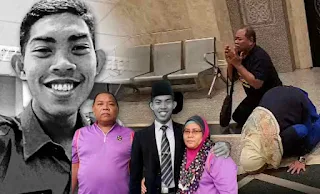 |
| Zulfarhan Osman |
A news report piqued my interest recently. The parents of a murdered college student prostrated in prayer right after the verdict was announced by the court of appeal that six accused would be hanged. Later, they told reporters they were showing their appreciation to the Almighty as justice was done.
These types of news often leave me more perplexed than I already am. An overseeing Almighty who was cognisant of all the things going on with their loved one but procrastinated would typically get a cold shoulder. If He were a mere mortal, He would get a notice of professional negligence for napping on the job. His nemesis, the horned and tailed one, through His proxies in robes, would have a field day trying to act smart and reenact all the fraction of seconds when danger could have been averted. But deep inside, these Satan's representatives on Earth thrive on maladies like these.
On one hand, we are products of the Original Sin, imperfect in every way and prone to being tempted to wrongdoings. However, we are still expected to bear the effects of our misdeeds.
We are expected to forgive and forget like He forgives us every time we commit a sin. And we claim that the justice He metes is just. Yet we investigate, leave nothing unturned, exhume, and do a forensic investigation to the last foxhole to pin down the perpetrator and hurl the whole might of the law against him. We gain joy in seeing the accused squirm and hide in shame. We call this justice prevailed.
On the other hand, we have an abundance of examples of the victims' families forgiving their aggressors. I covered this in another post. (See here.)
(P.S. For the curious, the abovementioned case happened in a military college in Kuala Lumpur. In 2017, six students, then 21, accused a 17-year-old junior of stealing a laptop computer. A seer had earlier identified the 17-year-old as the thief. The six students, together with 12 other friends, try to beat and torture the young boy to confess. They burnt his body and privates with hot iron. The perpetrators concealed him from the hostel warden, and delaying medical attention, the 17-year-old succumbed to his injuries two weeks later. The six accused were found guilty and sentenced to 18 years of jail. The accomplices were jailed for three years. The six were given sentences to hang at the Court of Appeal.)
(P.P.S. Alfred Hitchcock's 'Rope', based on an actual event, comes to mind. How two students of Chicago University in 1924 thought it was cool to snap the neck of a 14-year-old boy!)
google.com, pub-8936739298367050, DIRECT, f08c47fec0942fa0


.jpg)




%20-%20Anime%20News%20NetworkSEA.jpeg)














